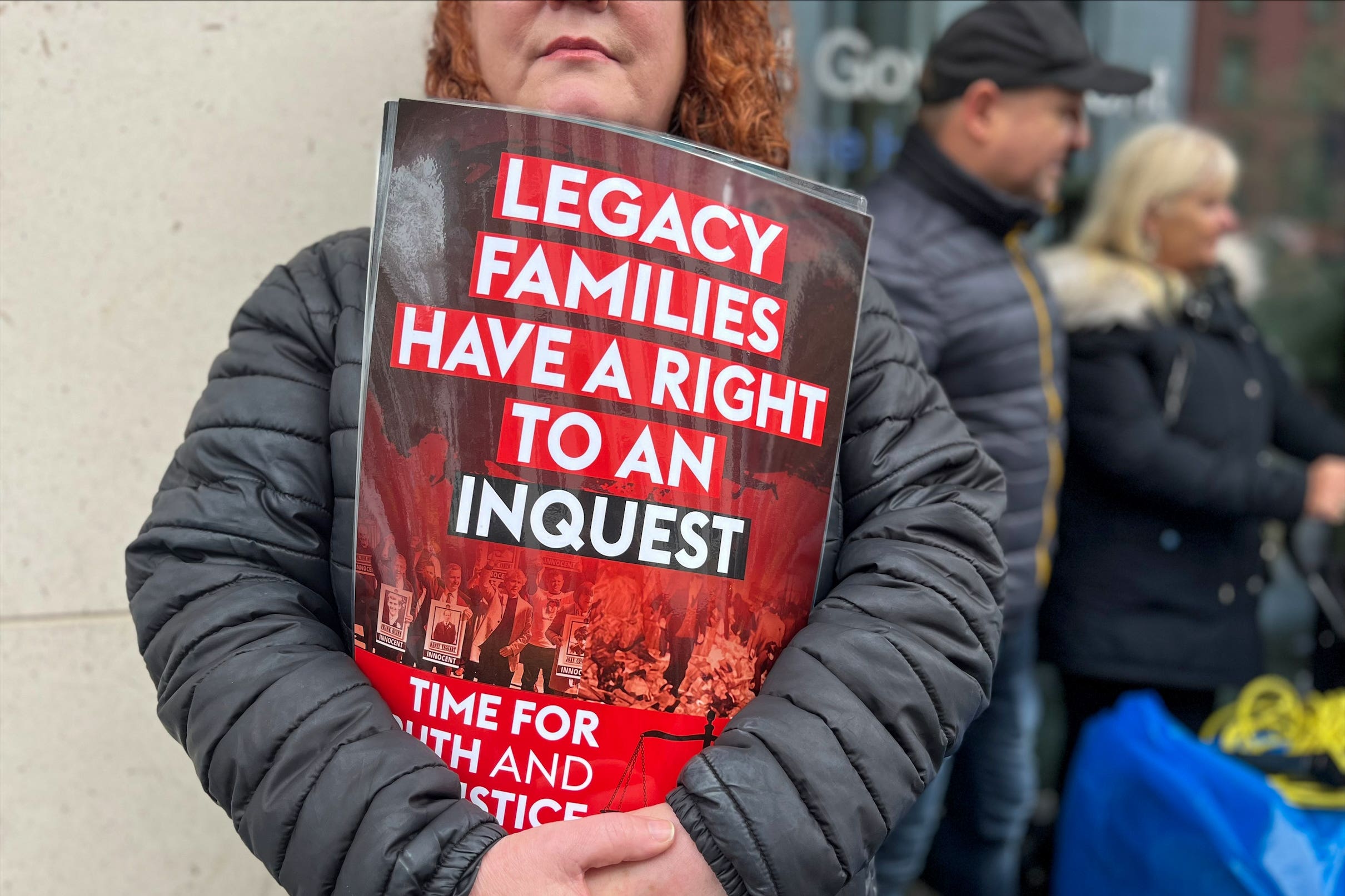Families of Troubles victims launch legal challenges to Legacy Bill
The families have lodged judicial review proceedings challenging its compatibility with international human rights standards.

A number of family members of victims of the Troubles have launched a High Court challenge to the Government’s controversial Legacy Bill.
The families, who all had relatives killed during the conflict in Northern Ireland, have lodged judicial review proceedings challenging the lawfulness of the legislation and its compatibility with international human rights standards.
The Northern Ireland Troubles (Legacy and Reconciliation) Bill has been passed into law and is awaiting royal assent.
The Bill will give a limited form of immunity from prosecution for Troubles-related offences to former terrorists who co-operate with a truth-recovery commission.
It will also halt all future civil cases and inquests.
The Bill was opposed by all major Stormont parties, victims’ campaign groups and the Irish government.
Madden & Finucane Solicitors released a statement on Friday outlining that they would be challenging the legislation on behalf of family members of Kathleen Thompson, Gervaise McKerr, Gerard Casey, Sam Marshall, Pearse Jordan and Gerard and Rory Cairns, all of whom were killed in the Troubles.
The statement also said that they intend to lodge applications to the European Court of Human Rights (ECHR) in Strasbourg.
Relatives of a further three victims have lodged judicial review proceedings with the High Court, represented by Harte Coyle Collins Solicitors.
The next of kin of Annette McGavigan, Thomas Burns and James (Jim) McCann lodged papers challenging all aspects of the legislation including the amnesty scheme.
Billy Thompson’s mother Kathleen was shot dead by a member of the Royal Green Jacket regiment in Derry on November 6 1971.
In 2022, a coroner rejected the evidence of a former soldier who killed Mrs Thompson and referred the matter to the Director of Public Prosecutions.
Jonathan McKerr’s father Gervaise was shot dead near Lurgan on November 11 1982 when members of an elite firearms unit of the RUC fired more than 100 rounds into a car he was driving, killing him and his two passengers.
All three were unarmed. An inquest into their deaths has never been concluded.
In May 2001, the ECHR found the UK to be in breach of the European Convention on Human Rights because no effective investigation had ever been conducted into Mr McKerr’s death.
Una Eakin is the widow of Mr Casey, who was murdered by loyalist paramilitaries on April 4 1989 in Rasharkin, north Antrim. Mr Casey had been threatened in Castlereagh in the 1980s and a legally held shotgun was seized by the RUC during a house raid six months before his death.
In 2007, Mr Casey’s inquest verdict was quashed by the High Court and in July 2010 the Attorney General for Northern Ireland ordered a new inquest into his death.
In 2022 the Police Ombudsman published a report which found “collusive behaviour” between security forces and loyalist paramilitaries in his murder.
Linda Hewitt is taking the case for her brother Mr Marshall, who was murdered by loyalist paramilitaries on March 7 1990 in Lurgan, shortly after leaving Lurgan RUC station after signing bail.
In a small urban area patrolled by at least 11 heavily armed undercover British soldiers on foot, in observation positions and in cars, two UVF men were able to enter the area, murder Mr Marshall and attempt to murder his two companions, and then safely withdraw unhindered.
Teresa Jordan’s son Pearse was shot dead by the RUC on the Falls Road, Belfast on November 25 1992. In 2016 a coroner formally referred two former RUC officers to the Public Prosecution Service to consider whether they should be prosecuted for perjury or perverting the course of justice arising from their evidence to the inquest. A prosecutorial decision has not yet been taken.
Eamon Cairns’ two sons Gerard and Rory were murdered in their home by the mid Ulster UVF in October 1993.
In 2019 a loyalist paramilitary admitted on a BBC Spotlight programme that he and others had conspired to murder every male member of the Cairns household and that intelligence had been received directly from the RUC. In May 2023 a file was submitted to the Director of Public Prosecutions.
May McGavigan’s sister Annette, a 14-year-old schoolgirl, was shot by the British army on September 6 1971 in Derry. The shooting is currently under investigation by the Legacy Investigation Branch of the PSNI.
Patricia Burns’ father Thomas was shot by the British army on July 12 1972 when leaving the Glenpark Social Club in North Belfast.
Mr Burns was an ex-serviceman who had served in the British Navy for 10 years and left behind his widow Kathleen and four young children Stephen, Patricia, John and Martin.
In March 2023, the Attorney General for Northern Ireland directed a fresh inquest into the shooting. Responsibility for the shooting is not disputed by the Ministry of Defence.
Daniel McCready’s uncle Mr McCann is alleged to have been shot by the British army on February 3 1973 in Belfast.
Mr McCann was one of six people shot in what has become known as the New Lodge 6 shootings. In February 2021, the Attorney General for Northern Ireland directed that a fresh inquest take place.
Taoiseach Leo Varadkar has said the Irish government is seeking legal advice on the possibility of taking an interstate case against the UK in relation to the Legacy Bill.
Bookmark popover
Removed from bookmarks